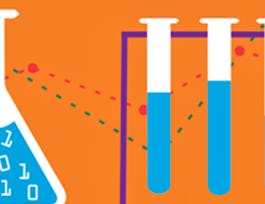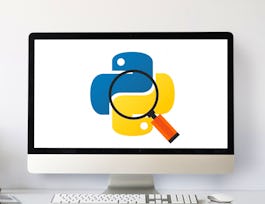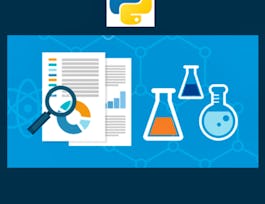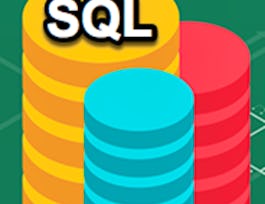In order to be successful in Data Science, you need to be skilled with using tools that Data Science professionals employ as part of their jobs. This course teaches you about the popular tools in Data Science and how to use them.


Tools for Data Science
This course is part of multiple programs.
Taught in English
Some content may not be translated



Instructors: Aije Egwaikhide
451,417 already enrolled
Included with 
Course
(28,273 reviews)
87%
Recommended experience
What you'll learn
Describe the Data Scientist’s tool kit which includes: Libraries & Packages, Data sets, Machine learning models, and Big Data tools
Utilize languages commonly used by data scientists like Python, R, and SQL
Demonstrate working knowledge of tools such as Jupyter notebooks and RStudio and utilize their various features
Create and manage source code for data science using Git repositories and GitHub.
Skills you'll gain
Details to know

Add to your LinkedIn profile
12 quizzes, 1 assignment
Course
(28,273 reviews)
87%
Recommended experience
See how employees at top companies are mastering in-demand skills

Build your subject-matter expertise
- Learn new concepts from industry experts
- Gain a foundational understanding of a subject or tool
- Develop job-relevant skills with hands-on projects
- Earn a shareable career certificate


Earn a career certificate
Add this credential to your LinkedIn profile, resume, or CV
Share it on social media and in your performance review

There are 7 modules in this course
In this module, you will learn about the different types and categories of tools that data scientists use and popular examples of each. You will also become familiar with Open Source, Cloud-based, and Commercial options for data science tools.
What's included
6 videos3 readings2 quizzes1 plugin
For users who are just starting on their data science journey, the range of programming languages can be overwhelming. So, which language should you learn first? This module will bring awareness about the criteria that would determine which language you should learn. You will learn the benefits of Python, R, SQL, and other common languages such as Java, Scala, C++, JavaScript, and Julia. You will explore how you can use these languages in Data Science. You will also look at some sites to locate more information about the languages.
What's included
5 videos1 reading2 quizzes
In this module, you will learn about the various libraries in data science. In addition, you will understand an API in relation to REST request and response. Further, in the module, you will explore open data sets on the Data Asset eXchange. Finally, you will learn how to use a machine learning model to solve a problem and navigate the Model Asset eXchange.
What's included
6 videos1 reading2 quizzes2 plugins
With the advancement of digital data, Jupyter Notebook allows a Data Scientist to record their data experiments and results that others can reuse. This module introduces the Jupyter Notebook and Jupyter Lab. You will learn how to work with different kernels in a Notebook session and about the basic Jupyter architecture. In addition, you will identify the tools in an Anaconda Jupyter environment. Finally, the module gives an overview of cloud based Jupyter environments and their data science features.
What's included
6 videos1 reading2 quizzes3 app items2 plugins
R is a statistical programming language and is a powerful tool for data processing and manipulation. This module will start with an introduction to R and RStudio. You will learn about the different R visualization packages and how to create visual charts using the plot function. In addition, Distributed Version Control Systems (DVCS) have become critical tools in software development and key enablers for social and collaborative coding. While there are many distributed versioning systems, Git is amongst the most popular ones. Further in the module, you will develop the essential conceptual and hands-on skills to work with Git and GitHub. You will start with an overview of Git and GitHub, followed by creation of a GitHub account and a project repository, adding files to it, and committing your changes using the web interface. Next, you will become familiar with Git workflows involving branches and pull requests (PRs) and merges. You will also complete a project at the end to apply and demonstrate your newly acquired skills.
What's included
7 videos2 readings3 quizzes5 app items3 plugins
In this module, you will work on a final project to demonstrate some of the skills learned in the course. You will also be tested on your knowledge of various components and tools in a Data Scientist's toolkit learned in the previous modules.
What's included
1 assignment1 peer review1 app item1 plugin
Watson Studio is a collaborative platform for the data science community and is used by Data Analysts, Data Scientists, Data Engineers, Developers, and Data Stewards to analyze data and construct models. In this module, you will learn about Watson Studio and IBM Cloud Pak for data as a service. Then you will create an IBM Watson Studio service and a project in Watson Studio. After creating the project, you will create a Jupyter notebook and load a data file. You will also explore the different templates and kernels in a Jupyter notebook. Finally, you will connect your Watson Studio account to GitHub and publish the notebook in GitHub. Note: This part of the course is optional and is not a mandatory requirement to complete the lab provided in this week of the course.
What's included
5 videos1 reading1 quiz1 app item2 plugins
Instructors



Offered by
Recommended if you're interested in Data Analysis
Why people choose Coursera for their career




Learner reviews
Showing 3 of 28273
28,273 reviews
- 5 stars
67.35%
- 4 stars
21.99%
- 3 stars
6.52%
- 2 stars
2.12%
- 1 star
1.99%
New to Data Analysis? Start here.

Open new doors with Coursera Plus
Unlimited access to 7,000+ world-class courses, hands-on projects, and job-ready certificate programs - all included in your subscription
Advance your career with an online degree
Earn a degree from world-class universities - 100% online
Join over 3,400 global companies that choose Coursera for Business
Upskill your employees to excel in the digital economy
Frequently asked questions
Access to lectures and assignments depends on your type of enrollment. If you take a course in audit mode, you will be able to see most course materials for free. To access graded assignments and to earn a Certificate, you will need to purchase the Certificate experience, during or after your audit. If you don't see the audit option:
The course may not offer an audit option. You can try a Free Trial instead, or apply for Financial Aid.
The course may offer 'Full Course, No Certificate' instead. This option lets you see all course materials, submit required assessments, and get a final grade. This also means that you will not be able to purchase a Certificate experience.
When you enroll in the course, you get access to all of the courses in the Certificate, and you earn a certificate when you complete the work. Your electronic Certificate will be added to your Accomplishments page - from there, you can print your Certificate or add it to your LinkedIn profile. If you only want to read and view the course content, you can audit the course for free.
If you subscribed, you get a 7-day free trial during which you can cancel at no penalty. After that, we don’t give refunds, but you can cancel your subscription at any time. See our full refund policy.





